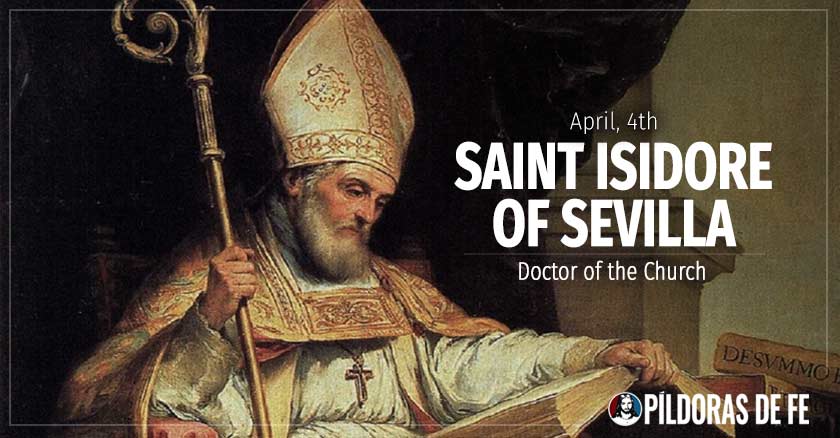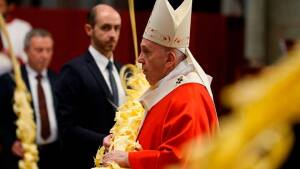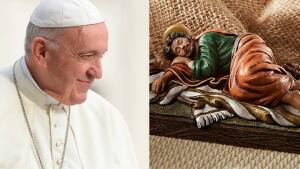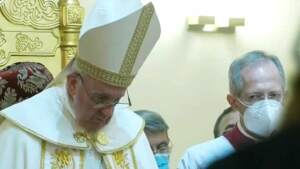Saint Isidore of Sevilla was a zealous bishop concerned about the cultural and moral maturity of the Spanish clergy. Patron of the Internet
Saint Isidore of Sevilla, Doctor of the Church, was a great scholar and Archbishop of Seville for more than three decades. He is widely regarded as the last of the Church Fathers. He was literally born into a family of saints in 6th century Spain. Two of his brothers, Leander and Fulgentius, and one of his sisters, Florentina, are venerated as saints in Spain. Pope John Paul II chose him as the patron saint of the Internet, to guide Catholics in its proper use.
Feast day: April 4th.
Roman Martyrology: Saint Isidore of Sevilla, bishop and doctor of the Church, who, as a disciple of his brother Leandro and his successor in the see of Seville, in Hispania Betica, wrote with erudition, convoked and presided over various councils, and worked with zeal and wisdom for the Catholic faith and for the observance of ecclesiastical discipline (year 636).
Biography of Saint Isidore of Sevilla.
Saint Isidore of Sevilla was born in Cartagena, from a family that included three other holy brothers - Leander, Fulgentius and Florentina. He was educated by his older brother, whom he succeeded as Archbishop of Seville many years later.
He was a surprisingly learned man, very wise and literate, sometimes called "The Master of the Middle Ages" because the encyclopedia he wrote was used as a textual enrichment book for nine centuries.
Very concerned about priestly formation, Saint Isidore of Sevilla ordered seminaries to be built in every diocese, wrote a Rule for religious orders and founded schools that taught all branches of learning.
Works of Saint Isidore of Sevilla.
Saint Isidore of Sevilla wrote numerous books, including a dictionary, an encyclopedia, a history of Goths and a history of the world, starting with creation!
Saint Isidore of Sevilla completed the Mozarabic liturgy, which is still in use in Toledo, Spain, and was also the author of the first encyclopedia in history: Etymologies
Their "Etymologies", was a vast encyclopedia of classical and modern knowledge, they preserved many fragments of classical learning.
The fame of Etymologies inspired abundant encyclopedic writings during the subsequent centuries of the Middle Ages. It was the most popular compendium in medieval libraries, and was printed in at least ten editions between 1470 and 1530
Thus, the great Saint Isidore of Sevilla summarized everything that Western Europeans knew about the works of Aristotle and other Greeks, and was an important reference book for many centuries. Its popularity continued during the Renaissance.
For all these reasons, Saint Isidore of Sevilla is known as the patron saint of the Internet.
Saint Isidore of Sevilla continued his austerities even as he approached the age of 80. During the last six months of his life, he increased his charity so much that his house was filled all day and night with the poor of the countryside
The 76 years of St. Isidore´s life were lived in a time of conflict and growth for the Church in Spain. The Visigoths had invaded the land a century and a half before, and shortly before Isidore´s birth they created their own capital. They were Arians, and they claimed that Christ was not God. Thus, Spain was divided into two groups: One people: the Roman Catholics, fighting against another: (The Arian Goths).
Saint Isidore of Sevilla brought all of Spain together, making it a center of culture and learning. The country served as a model and guide for other European countries whose culture was also threatened by barbarian invaders.
Saint Isidore of Sevilla was the last of the ancient Christian philosophers and the last of the great Fathers of the Latin Church. He was undoubtedly the most learned man of his time and had a far-reaching influence on the educational life of the Middle Ages.
His contemporary and friend, Braulio, Bishop of Zaragoza, considered him as a man raised up by God to save the Spanish people from the wave of barbarism that threatened to flood the ancient civilization of Spain.
The Eighth Council of Toledo (653) recorded his admiration for his character in these brilliant terms:
"The extraordinary doctor, the last adornment of the Catholic Church, the most learned man of the latter, must always be named with reverence, Isidore"
This tribute was ratified by the 15th Council of Toledo, held in 688.
In Dante´s Paradise (Divine Comedy X.130), Saint Isidore of Sevilla is mentioned among the theologians and doctors of the Church together with the Scottish, Richard de San Víctor, and the English Bede.
Saint Isidore of Sevilla was above all a zealous bishop concerned with the cultural and moral maturity of the Spanish clergy. For this reason, he founded an ecclesiastical college, the prototype of future seminaries, dedicating much space to the education of candidates for the priesthood
Saint Isidore of Sevilla was canonized in 1598, and declared a Doctor of the Church in 1722.
Prayer to Saint Isidore of Sevilla before surfing the Internet.
Almighty and eternal God, who created us in your image and asked us to seek all that is good, true and beautiful, especially in the divine person of your only-begotten Son, our Lord Jesus Christ, we beg you, through the intercession of Saint Isidore of Sevilla, bishop and doctor, during our navigation on the Internet, to direct our hands and eyes only to what is pleasing to you and to treat all those souls we meet with charity and patience.
Through the same Jesus Christ our Lord.
Amen.
Another Daily Saints.

Holy Guardian Angels (Feast) Guardian Angels. Messengers of God
Feast of the Holy Guardian Angels or Guardian Angels, they are God´s messengers. They take care of us on Earth and guide us to Heaven. Custodians of Our Souls
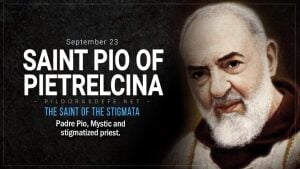
St. Pio of Pietrelcina. Mystic and stigmatized priest.
Padre Pio received the Stigmata and wore them for 50 years. St. Pio of Pietrelcina dedicated himself to Spiritual Direction and Confession. Biography
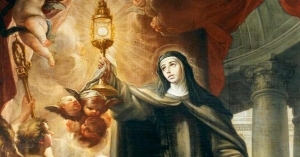
Saint Clare of Assisi. Disciple of St. Francis. Founder of the Poor Clares
St. Clare of Assisi was the founder of the Poor Clares. Her life was rich in works of charity. She was a disciple of St. Francis of Assisi
Biografía, celebraciones y Fiestas de la Iglesia
 Venezuelan, faithful husband and father of a family. Electronic engineer and missionary of the faith. Committed to the proclamation of the Gospel. Solid believer that there are always new beginnings. Whoever has God has nothing to stop him.
Venezuelan, faithful husband and father of a family. Electronic engineer and missionary of the faith. Committed to the proclamation of the Gospel. Solid believer that there are always new beginnings. Whoever has God has nothing to stop him.